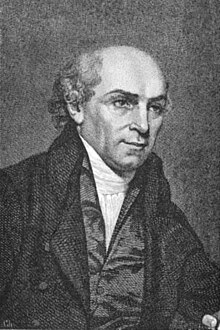William Carey (missionary)
| William Carey | |
|---|---|

Missionary to India
|
|
| Born |
17 August 1761 Paulerspury, England |
| Died | 9 June 1834 (aged 72) Serampore, India |
William Carey (17 August 1761 – 9 June 1834) was a British Christian missionary, Particular Baptist minister, translator, social reformer and cultural anthropologist.
He went to Kolkata (India) in 1793, but was forced to leave the British Indian territory by non-Baptist Christian missionaries. He joined the Baptist missionaries in the Danish colony of Frederiksnagar in India (Serampore). One of his first contributions was to start a school for impoverished children where they were taught skills such as reading and writing, as well as Christianity. He opened the first theological university in Serampore (India) offering divinity degrees, and campaigned to end the practice of Sati.
Carey is known as the "father of modern missions." His essay, An Enquiry into the Obligations of Christians to Use Means for the Conversion of the Heathens, led to the founding of the Baptist Missionary Society.The Asiatic Society commended Carey for “his eminent services in opening the stores of Indian literature to the knowledge of Europe and for his extensive acquaintance with the science, the natural history and botany of this country and his useful contributions, in every branch.”
He translated the Hindu classic the Ramayana into English, and the Bible into Bengali, Oriya, Assamese, Arabic, Marathi, Hindi and Sanskrit. William Carey has been called a reformer and illustrious Christian missionary, as well as a "colonial ideologue with prejudice, hyperbole and concealed racism" by those who disagree with him.
William Carey, the oldest of five children, was born to Edmund and Elizabeth Carey, who were weavers by trade,in the hamlet of Pury End in the village of Paulerspury, Northamptonshire. William was raised in the Church of England; when he was six, his father was appointed the parish clerk and village schoolmaster. As a child he was naturally inquisitive and keenly interested in the natural sciences, particularly botany. He possessed a natural gift for language, teaching himself Latin.
...
Wikipedia
